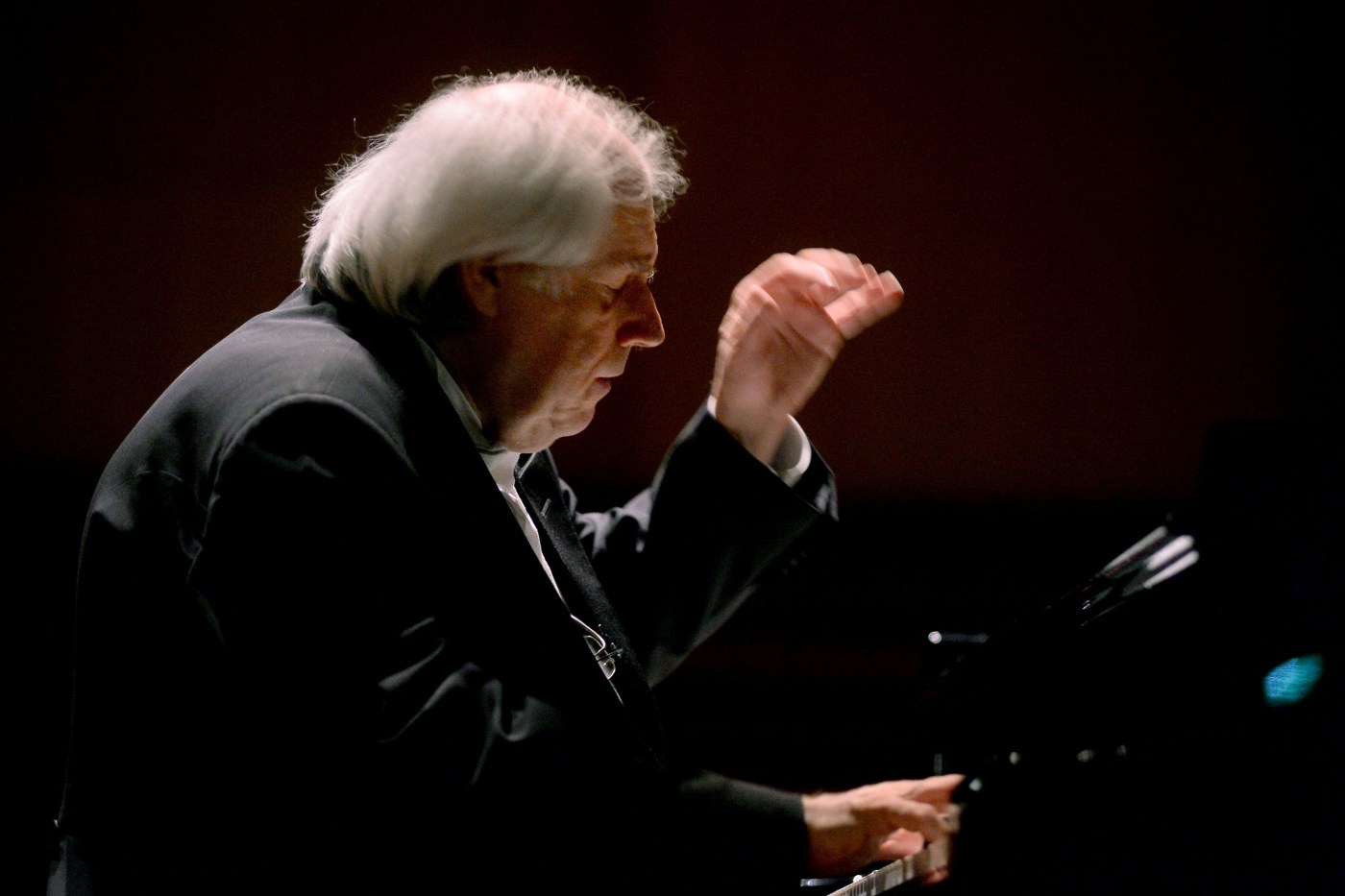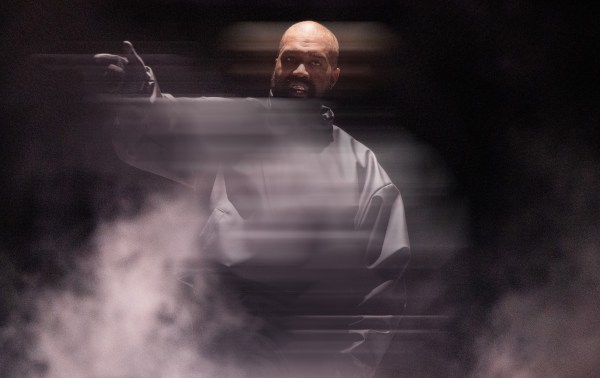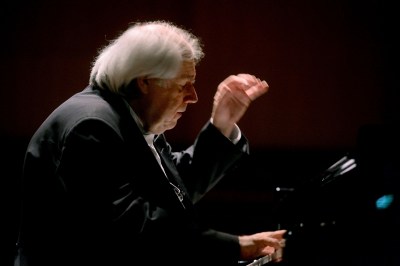Turn any article into a podcast. Upgrade now to start listening.
Premium Members can share articles with friends & family to bypass the paywall.
One morning at the Salzburg Festival last month, there was a little ceremony, lasting maybe 10 minutes. This festival, in the heart of Austria, is a heavyweight in the classical music world. The ceremony was intimate, with maybe 25 people in attendance. One of them was Cecilia Bartoli, the starry Italian mezzo-soprano.
The purpose of the ceremony was to honor Grigory Sokolov, a Soviet-born pianist. Festival officials were giving him the Gold Festival Brooch with Rubies. Why? Well, first, Sokolov is great. Second, he has played an annual recital at the festival for years. Third, he had recently marked a milestone birthday: his 75th.
There was not much fuss at the ceremony—fuss may well have spooked the honoree. The festival’s artistic director, Markus Hinterhäuser, gave an improvised speech, paying tribute to Sokolov. Hinterhäuser is a pianist himself, in addition to an administrator. This was one pianist expressing admiration—indeed, awe—for another.
Sokolov listened, smiling.
In due course, festival officials handed him the brooch. At this point, an honoree would say a few words in response. Sokolov said nothing—which was completely unsurprising. (I will expand on this in a moment.)
He did, however, engage in social conversation with guests for a while. He chatted in German, Italian, and English. He looked very happy and pleased. And then he tottered off.
Over the years, there have been a fair number of articles about Grigory Sokolov, in which writers grope for words about his peculiar greatness. I will do some groping myself—after a few mundane biographical words.
Sokolov was born in Leningrad in 1950. At age 16, he became the youngest person ever to win the gold medal at the Tchaikovsky Competition in Moscow. That is not so mundane. The chairman of the jury was Emil Gilels, the great pianist who served as a model for younger generations.
Like other Soviet-born pianists—Arcadi Volodos, Evgeny Kissin, Yefim Bronfman, Igor Levit, Daniil Trifonov—Sokolov has long lived in the West. He is a Spanish citizen who resides in Italy. Volodos is a French citizen who resides in Spain. Modern arrangements can be odd.
Is Sokolov the best pianist in the world? His devoted fans tend to think so, and man is a ranking animal. There must be a 1, 2, and 3. I myself resist ranking. Instead, I like to quote Bum Phillips, the football coach of yore. Talking about his great running back, Earl Campbell, he said, “I don’t know if he’s in a class by himself, but I do know that when that class gets together, it sure don’t take long to call the roll.”
Sokolov is a living legend—pardon the cliché—and almost a myth. There is an air of mystery about him. “We must not let daylight in upon the magic,” wrote Walter Bagehot. He was talking about the British monarchy (a long time ago, in the 19th century).
Sokolov does not give interviews. He wants his art to do the talking. Before listening to him chat with guests after that ceremony in Salzburg, I had never heard him speak. He does not speak from the stage, ever.
This is extremely rare in the classical music world these days. You are supposed to be “relatable.” From the stage, you’re supposed to say, “How y’all doin’ tonight? Ready for some music?” You are supposed to “build an audience” through social media. Opera singers post semi-porny pictures of themselves on Instagram.
Grigory Sokolov could not be more unlike all of this.
He does not make recordings—studio recordings. Occasionally, he allows a live performance to be released. There are, however, many pirate recordings of his playing: Audience members capture him with their smartphones and such.
Long ago, Sokolov stopped playing concertos. He does not appear with orchestras. Too much collaboration, too many variables. Sokolov likes to have maximum control over the music-making. It’s not that he’s selfish, it’s that he has high standards.
To America, he does not come. If we Americans want to hear him, we have to go to Europe. He last appeared at Carnegie Hall in 1975.
A Sokolov recital has its patterns, its rituals. The hall is dark. There is no spotlight on the piano. This is a little spooky, but the eyes adjust. Sokolov does not want to be bothered by lights, evidently.
He walks slowly, deliberately, from the wings. He walks along the back of the stage. When he gets to the piano, he bows gravely to the audience and sits down. The audience listens to his playing in hushed wonder. When he is finished, he gets up, makes the same grave bow, and walks slowly, deliberately, along the back of the stage to the wings.
I have never seen him smile during a recital. I had never seen him smile until that morning in Salzburg, when his face was positively wreathed in the warmest of smiles.
At the piano, he is all concentration. He is like a musical monk (with his bald pate and long fringe of hair contributing to the image). He marches to the beat of his own drum and hears his own music. Let me quote Henry David Thoreau, precisely: “If a man does not keep pace with his companions, perhaps it is because he hears a different drummer. Let him step to the music he hears, however measured or far away.”
An episode from Sokolov’s 2018 recital in Salzburg will provide an illustration. I’ll quote from my review:
As Sokolov was nearing the end of his first half, something remarkable happened (aside from the playing). A rainstorm broke out in Salzburg, and the roof of the Great Festival Hall sprang a leak. Rain was pouring in from a light fixture, dousing the patrons in the second row or so. Some stood up, trying to leave or otherwise wondering what to do. You can imagine the commotion. Sokolov kept playing, unperturbed. That was professionalism.
On the other hand, I’m not 100 percent sure that Sokolov was even aware of the problem. Typically, he’s in his own private Idaho.
A festival official later confirmed to me: Sokolov had had no idea.
His repertoire is large, ranging from the Renaissance to Stravinsky or so. He is a phenomenal virtuoso, who can tear off Rachmaninoff with the best of them, but he likes to play the early composers, such as Byrd and Purcell, or Couperin and Rameau. He has this in common with Glenn Gould, the legendary Canadian.
Sokolov is sometimes compared to Gould. The Canadian was eccentric. “That nut’s a genius,” said George Szell, the great conductor. I would not describe Sokolov as eccentric—rather, as private and distinctive. Gould could be nutty in his playing; Sokolov is never nutty.
There is also this difference: Gould quit the concert stage, retreating to the recording studio, where he meticulously produced his albums. Sokolov, as you know, eschews the studio in favor of the concert stage.
“Comparisons are odorous,” says Shakespeare’s Dogberry. Suffice it to say that Gould was an individual, and a great one, and so is Sokolov.
He has all the pianistic gifts, Sokolov. He is clear and articulate. He can be silky smooth. He coaxes any number of colors out of the piano. He creates sounds that you may not have thought possible from a piano.
“Playing the piano?” said Joshua Bell, the violinist, in an interview with me once. “You may as well be typing!” He was just kidding. He has ample respect for pianists. Yet it is true that a pianist is less responsible for his sound than a violinist is. Nonetheless, a pianist has options, certainly if he is a Sokolov.
Grigory Sokolov is an exemplary marriage of fingers, head, and heart. Let me say, however, that he does not always entrance. He can be bland, dull—ordinary. So could Vladimir Horowitz, that wizard (whom I heard in two recitals). So can another wizard, Mikhail Pletnev. But then comes the magic. Sokolov weaves his spell, somehow. Over and over in my reviews, I have resorted to the words “witchcraft” and “voodoo.” When Sokolov plays Chopin’s Mazurkas, for example, you may feel a little dizzy.
We are in the realm of the unteachable and intangible.
This year in Salzburg, Sokolov played a recital divided by two Bs: Byrd (on the first half) and Brahms (on the second). The Byrd pieces were expertly sculpted. Everything was in balance. Not every Brahms piece was involving and transcendent—but several were. I sat there thinking, “Did even Brahms know what this music could do? How good it is?”
Elsewhere in Salzburg, I spoke with a woman who knows the pianist, and Switzerland, too. She made the following observation: “A Swiss lake is beautiful, quiet, and deep—very deep. That’s Sokolov.”







Please note that we at The Dispatch hold ourselves, our work, and our commenters to a higher standard than other places on the internet. We welcome comments that foster genuine debate or discussion—including comments critical of us or our work—but responses that include ad hominem attacks on fellow Dispatch members or are intended to stoke fear and anger may be moderated.
With your membership, you only have the ability to comment on The Morning Dispatch articles. Consider upgrading to join the conversation everywhere.